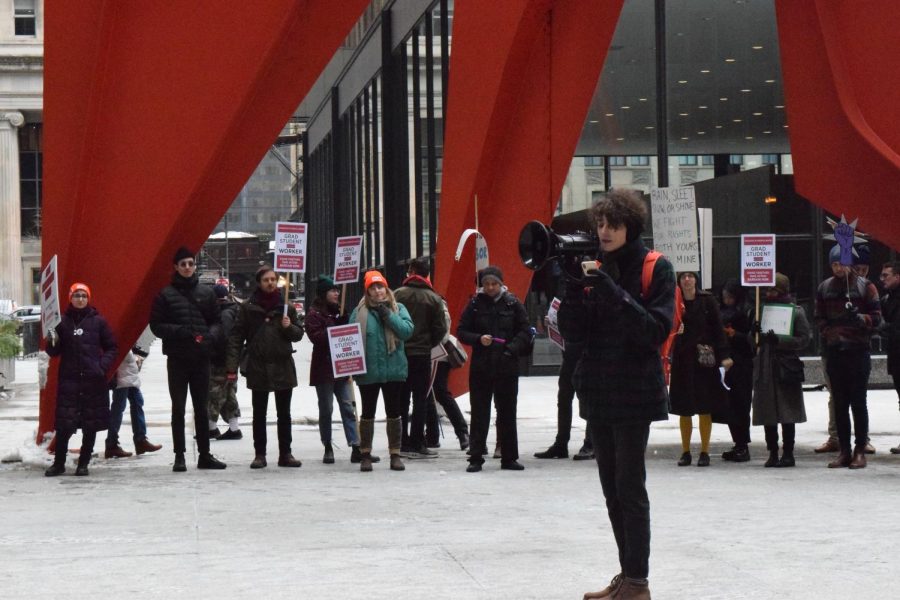2020 Vision: Despite roadblocks, Northwestern University Graduate Workers remain optimistic about unionization
Cameron Cook/Daily Senior Staffer
A NUGW member speaks at a protest in Chicago on Thursday. Entering the new decade, the group plans to continue to fight for union recognition.
November 18, 2019
This is the third article in a series called “2020 Vision” which walks through the reflections and hopes student groups, administrators and others throughout Northwestern have on the past few years and upcoming new decade.
In September, President Trump’s National Labor Relations Board proposed a rule that would strip graduate students of their right to unionize. University President Morton Schapiro has stated that unionization is “a bad move” that could harm the relationship between professors and graduate students.
With these overarching forces at play, Northwestern University Graduate Workers is growing and pushing for unionization and recognition, all while attempting to hold the University accountable on individual issues that affect graduate students.
Despite the federal agency’s long-anticipated proposal, there is hope for NUGW. Separate from the labor relations board, graduate unions can lobby for voluntary recognition from their schools. And while it attempts to build a critical mass of students, the organization has helped incite changes at Northwestern.
“We have actually accomplished a lot in the last year,” said Anna Zalokostas, a third-year English graduate student. “The administration does take us quite seriously, even if they won’t recognize us. I think they’re a little bit scared of what we can accomplish.”
NUGW successfully campaigned for five full years of guaranteed funding in 2017 and took a prominent role in repealing a 2018 international student technology fee. This September, members protested a raised cost for outpatient mental health care from Northwestern’s health insurance provider, and at least for this school year, the cost was scaled back.
NUGW co-chair Kitty Yang, a sixth-year math graduate student, called the present moment “a turning point.” The initial leaders of the group, founded only three years ago, are starting to graduate, and Yang emphasized the need to nurture younger leaders and to formalize their governance structure.
Their end goal: to become a recognized union and gain an influential seat at the table for funding and policy negotiations, Yang said. She points to a recent University of Chicago decision that came with little student input, raising funding for graduate students but capping enrollment and restructuring Ph.D. student teaching.
“We want to get funding, but ultimately, we want a union because this would prevent (the University) from putting through these types of unilateral decisions,” Yang said. “It’s about not having any input or any agency in something that really, really matters because ultimately, when there aren’t enough grad students, the work falls on us.”
Zalokostas, who coordinates NUGW’s Unity committee, reiterated that unionization isn’t just about tangible financials — it’s about getting a better quality of life with things like dependent care for health insurance and standardized workloads for TAs.
Graduate students teach, do research and grade — often vital behind-the-scenes grunt work.
NUGW co-chair Andrew Hull, a sixth-year graduate student in philosophy, said he’s encouraged by the community support he’s seen, and feels like all the group has to do is convince the administration.
“It is good for everybody to make graduate workers more able to do our work that makes this university function,” Hull said. “So the undergraduates at Northwestern think of it not as this frustrating place full of mediocre instructors and graders but as a wonderful academic institution.”
As they rally for recognition, NUGW will focus on building up their numbers. Mauricio Maluff Masi, a second-year philosophy graduate student, said he was interested in joining NUGW from his first day on campus and is optimistic about the group’s future.
Students should be able to rely on the union when they have an issue, knowing they can get help from involved friends and colleagues, Maluff Masi said.
“I think we have to seriously retool our organization,” he said. “So the union is not just a sort of amorphous thing that is out there somewhere, but it’s a living, breathing entity in each department.”
NUGW does not exist in a vacuum for graduate student issues. The Graduate Leadership & Advocacy Council aims to maintain “a system of participatory student governance” for Northwestern graduate students, according to its website. GLAC is linked with the University and maintains a neutral stance on NUGW.
According to Hull, GLAC’s external communications chair, the council will transition to the new title of Graduate Student Government. They also aim to consolidate Northwestern’s Graduate Student Association and Chicago Graduate Student Association.
While NUGW is student-run and works solely for graduate workers, GLAC has advocated from within the administration. But Yang said graduate students get “zero actual input” through the governance, and neither GLAC nor the new GSG is a substitution for an actual contract.
“We see that the university knows that we want a voice,” Yang said. “But they do not want to actually give us anything that looks like a voice. And so ultimately for us, really the vision is a union.”
Email: [email protected]
Twitter: @stephencouncil


